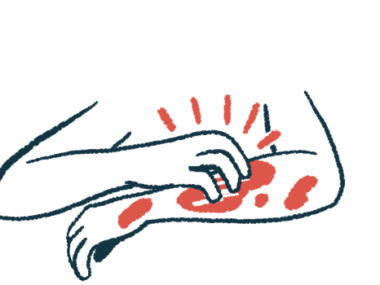PTR-01 Granted FDA’s Fast Track Status for Treatment of Recessive Dystrophic Epidermolysis Bullosa
Written by |

Note: This story has been updated to note that the gene that codes for collagen type VII protein is the COL7A1 gene, not the C7 gene.
Phoenix Tissue Repair’s investigational therapy PTR-01 was granted fast track designation by the U.S. Food and Drug Administration (FDA) for the treatment of recessive dystrophic epidermolysis bullosa (RDEB), the company announced.
The designation is intended to speed the therapy’s development and review, and enables more frequent communication with the FDA. Treatment candidates with this status may also benefit from accelerated approval and priority review.
PTR-01 is a recombinant version of the human collagen type VII (rC7), which is mutated in dystrophic epidermolysis bullosa patients. The potential disease-modifying treatment is administered into the blood, and works by replacing defective collagen type VII proteins with healthy collagen at sites where it’s needed.
Currently, no cure or effective treatment is available for RDEB patients, but this treatment seems to effectively promote wound healing, as seen in mouse models of RDEB.
“Patients and their caregivers have been waiting far too long for treatments that go beyond palliative care for RDEB, and fast track designation is an important step forward in the development of PTR-01,” Neil Kirby, president and CEO of Phoenix Tissue Repair, said in a press release.
“We continue to work diligently to advance what we believe could be the first systemic therapeutic agent that aims to target the root cause of the disease,” he said.
PTR-01 is currently being tested in the PTR-01-001 Phase 1/2 trial (NCT03752905), at Stanford University, in California. The study is still recruiting participants, and expects to include 14 adult RDEB patients with a mutation on both copies of the COL7A1 gene and a history of at least one chronic wound.
The study’s primary objective is to determine the therapy’s safety and tolerability. Another goal is to measure PTR-01’s preliminary efficacy, as assessed by levels of collagen type VII in skin biopsies, wound healing, and clinically meaningful changes in patient-reported outcomes.
The trial is divided in three parts: a first screening period of four weeks, a 10-week treatment period, and an eight-week follow-up. No treatment is administered during the screening and follow-up.
Participants will be enrolled and divided into three cohorts of two, four, and eight patients. Each cohort will be divided into two groups of an equal number of patients.
Then, in each cohort, patients will be randomly assigned three doses of PTR-01 followed by three doses of saline solution (control), or three doses of saline solution followed by three doses of PTR-01. The doses are administered every 15 days. The trial has begun dosing patients.





